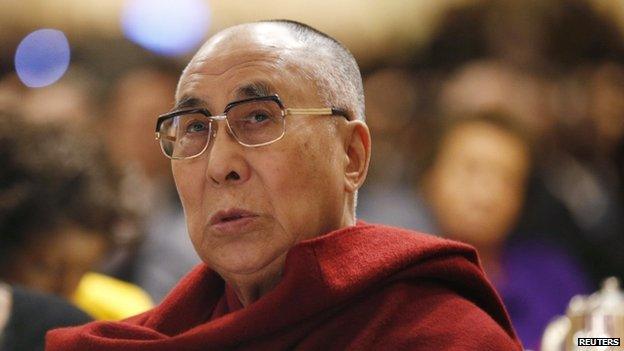China media criticise Dalai Lama-Obama meeting
- Published

China traditionally reacts angrily to meetings between foreign leaders and the Dalai Lama
Papers criticise the US as a "trouble-maker" after President Barack Obama met exiled Tibetan spiritual leader the Dalai Lama and called him a "good friend".
Speaking at the White House National Prayer Breakfast, with the Dalai Lama in the audience, Mr Obama said the Tibetan Buddhist leader was an inspiration for freedom and dignity of all human beings.
China objects to foreign leaders meeting the Dalai Lama because they see him as a separatist.
"Any possible meeting or encounter between the two is sure to have negative consequences because the Dalai Lama is a political liability which backfires," Xinhua News Agency, external says.
"There may be self-claimed friendship between Mr Obama and the Dalai Lama as individuals... What lies under their hypocritical relationship is nothing but political deals and cold calculations," it adds.
The news agency warns that Mr Obama has "dampened the hard-won positive momentum in China-US relations" by meeting the Tibetan leader.
Echoing similar views, another Xinhua commentary, external describes the US as a "trouble-maker" and a stumbling block to a better China-US relationship.
"The US wants to use the Dalai Lama and the Tibet issue to create trouble for China. Their goal is merely impossible," warns the article, adding that "Washington's sincerity" to forge stronger ties with Beijing is "doubtful".
An opinion piece in the state-run China Net news portal , externalobserves that Mr Obama has been "unrepentant" over his meeting with the exiled leader and warns the US president against "planting a dangerous bomb" in bilateral relations.
The Dalai Lama, the spiritual head of Tibetan Buddhism, fled his homeland in 1959 for India after a failed uprising against Chinese rule.
He is regularly vilified by the Chinese government, which accuses him of trying to split Tibet, with its separate culture and language, from the rest of China.
Economic policy
Turning to other news, papers look at the economy after the central bank's move to cut bank reserves failed to lift market confidence.
On Wednesday, the central bank cut its reserve ratio requirement (RRR) - the amount of cash banks have to hold as reserves - by 0.5% to 19.5%, in the first industry-wide move since 2012.
Chinese shares fell on Thursday as the move failed to ease concerns of an economic slowdown.
Lu Lei, head of the People's Bank of China's research department, explains that the cut is "an ordinary policy operation" that is "based on the economic situation and liquidity conditions", Xinhua reports, external.
Pointing out that an expected strong cash demand during the upcoming Spring Festival holiday may have been a factor behind the move, the expert adds that the cut should not be seen as the start of a strong stimulus for the economy.
The overseas edition of the People's Daily, external appears to play down worries over the country's economic health and highlights that the decision is not "China's version of quantitative easing (QE)" but just a "flexible" adjustment to "support" the economy.
Royal visit
And finally, papers and net-users are abuzz with reports of Prince William's upcoming visit to China. According to the China Daily, external, Prince William's trip is likely to start on 1 March.
He will visit Beijing, Shanghai and Yunnan province in southwest China to promote wildlife protection, the report adds.
The daily also notes that news of the visit has received "a warm welcome" on Sina Weibo, China's popular microblog service.
Tian Dewen, a researcher at the Chinese Academy of Social Sciences, says that the visit shows British "willingness to improve its ties with China".
"But as with past royal visits, we should not expect any political moves. I assume he will mainly focus, as usual, on global topics like wildlife protection," adds the pundit.
BBC Monitoring reports and analyses news from TV, radio, web and print media around the world. You can follow BBC Monitoring on Twitter, external and Facebook, external.